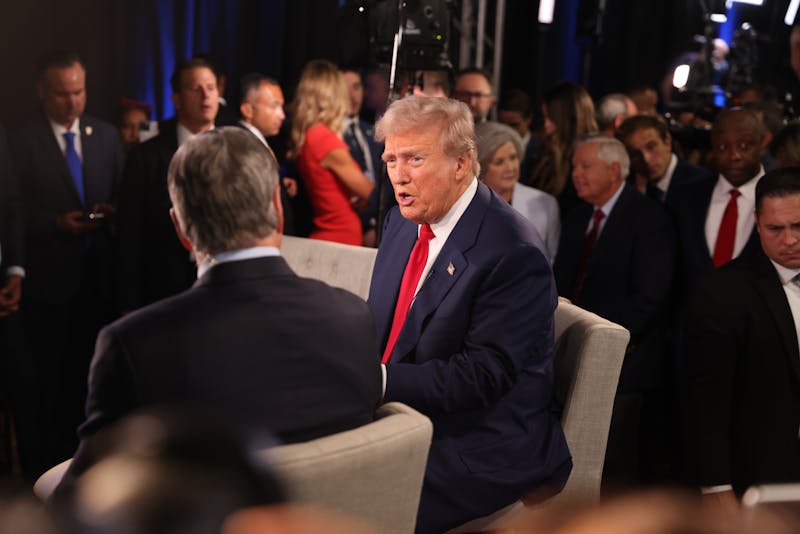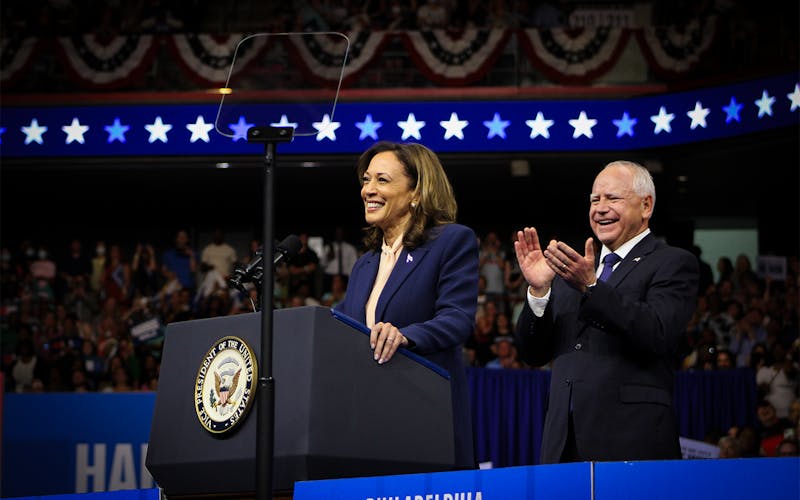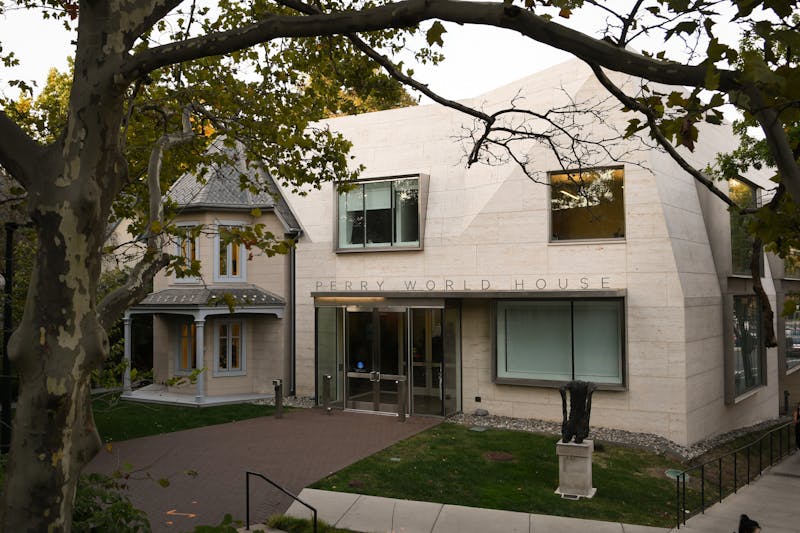
Guest Columnist Elizabeth Collins compares speeches of Winston Churchill and Donald Trump, offering suggestions for unifying political rhetoric in her column.
Credit: Ethan YoungAs I descended the steps near 10 Downing Street, I felt the chilly March London air linger on the back of my head while I was transported into the secrets of Churchill War Rooms. Every detail, from the scratched arms of his wooden chair to the massive map in the Annexe, illustrated Churchill's fervent command during World War II.
His rhetoric stands as a beacon of unity, transcending divisions, thrilling audiences, cementing alliances, and inspiring British and Americans during their shared fight against the Axis powers. Churchill's address to Congress in 1941, juxtaposed with Donald Trump's 2020 Independence Day speech, highlights the role of political rhetoric in mobilizing or polarizing a nation.
While Churchill and Trump used similar rhetorical strategies in their speeches, their goals and outcomes diverged dramatically. Churchill aimed to unite the British and American people against a common enemy, whereas Trump sought to energize his base by pitting one group of Americans against another. The focus and intent behind each leader's rhetoric shaped its ultimate impact.
In his 1941 address to Congress, Churchill employed a "we-versus-them" approach by emphasizing his connection to American ideals and portraying the Axis powers as a shared enemy. "I am a child of the House of Commons. I was brought up in my father's house to believe in democracy. 'Trust the people,'" Churchill said, creating commonality with the American people. Churchill characterized the Axis forces by saying, "They are bitter, they are ruthless,” uniting Britain and the United States in a common resolve.
In contrast, Trump's 2020 Independence Day speech harnessed a "us-versus-them" frame, but he emphasized a "cultural civil war." His speech, delivered amidst the COVID-19 pandemic and national debates over racism, characterized the Democratic party as a "far-left fascism," that is desecrating America's "values, history, and culture." Instead of rallying Americans against a common external threat like COVID-19, Trump used the moment to further divide the country along partisan lines. An American version of Churchill might have used this opportunity to unify the country in the fight against the pandemic, but Trump’s rhetoric emphasized division.
Both leaders also invoked the past to shape the present, yet their interpretations were vastly different. Churchill referred to America's post-World-War-I reluctance to enter conflicts, using this historical context to rally Americans for the challenges ahead. Trump, however, romanticized America's past and positioned himself as the defender of its soul. His slogan, "Make America Great Again," along with his defense of controversial national monuments, including Confederate statues, framed his purpose as the mission to protect a threatened heritage. Where Churchill successfully fostered morale and unity, Trump's use of the past intensified partisan divides.
Religious allusions were another tool both leaders employed. Churchill recites Psalm 112:7, which reads, "He shall not be afraid of evil tidings. His heart is fixed, trusting in the Lord." Although Churchill was not an active believer in Christ, he used the word "Christian" to relate with Anglo-Saxon people and communicate messages of destiny, chance, fortune, and fate. Trump, however, cast his candidacy as a divine mission, saying, "And that which God has given us, we will allow no one, ever, to take away.” By invoking divine endorsement, Trump tapped into the religious beliefs of his supporters to advance his political agenda, further polarizing the country rather than fostering national morale. An American Churchill would inspire faith for national morale, offering a strategy to unify Americans across political divides through shared purpose.
While Churchill’s rhetoric aimed to inspire confidence and hope amidst hardship, Trump’s words amplified divisions, positioning him as a savior of a threatened America. Churchill acknowledged the hardships ahead while expressing faith in eventual victory. Trump, however, positioned himself as a savior, vilifying opponents and stoking fears to mobilize his base. These contrasting approaches offer a stark lesson on the role of political language in shaping a nation's destiny.
From studying Churchill’s War Room in London to analyzing his speeches, I’ve come to admire his ability to unite people under common challenges. Comparing his rhetoric to Trump’s reveals how similar techniques can lead to vastly different outcomes, depending on the speaker’s intent. Churchill’s focus on unity rallied the United States to enter World War II with conviction, while Trump’s divisive rhetoric deepened polarizing debates over issues like national monuments and racial injustice.
However, many Trump voters dismiss his rhetoric, claiming they support his policies without endorsing his character. While policy considerations are crucial when casting a vote, the power of rhetoric should not be overlooked. As Churchill demonstrated, rhetoric has the ability to unify and instill confidence in a nation facing grave threats. Conversely, rhetoric can also sow division and weaken a nation.
Trump’s words are powerful, and they are consequential. He doesn’t need to be your friend, but his rhetoric does matter — more than just policy alone.
Before casting your vote on Nov. 5, consider not only policy but also the power of language, which has shaped the course of history in profound ways.
By examining the capacity of rhetoric, we can create a blueprint for a contemporary American Churchill: a leader who unifies Americans around shared values and common challenges. I hope this analysis encourages future leaders to prioritize unity and morale in their rhetoric, using gratitude, humility, and faith as guiding principles, just as Churchill did.
ELIZABETH COLLINS is a College senior studying communications and consumer psychology from Phoenix, Ariz. Her email is libcol@sas.upenn.edu.
The Daily Pennsylvanian is an independent, student-run newspaper. Please consider making a donation to support the coverage that shapes the University. Your generosity ensures a future of strong journalism at Penn.
Donate








